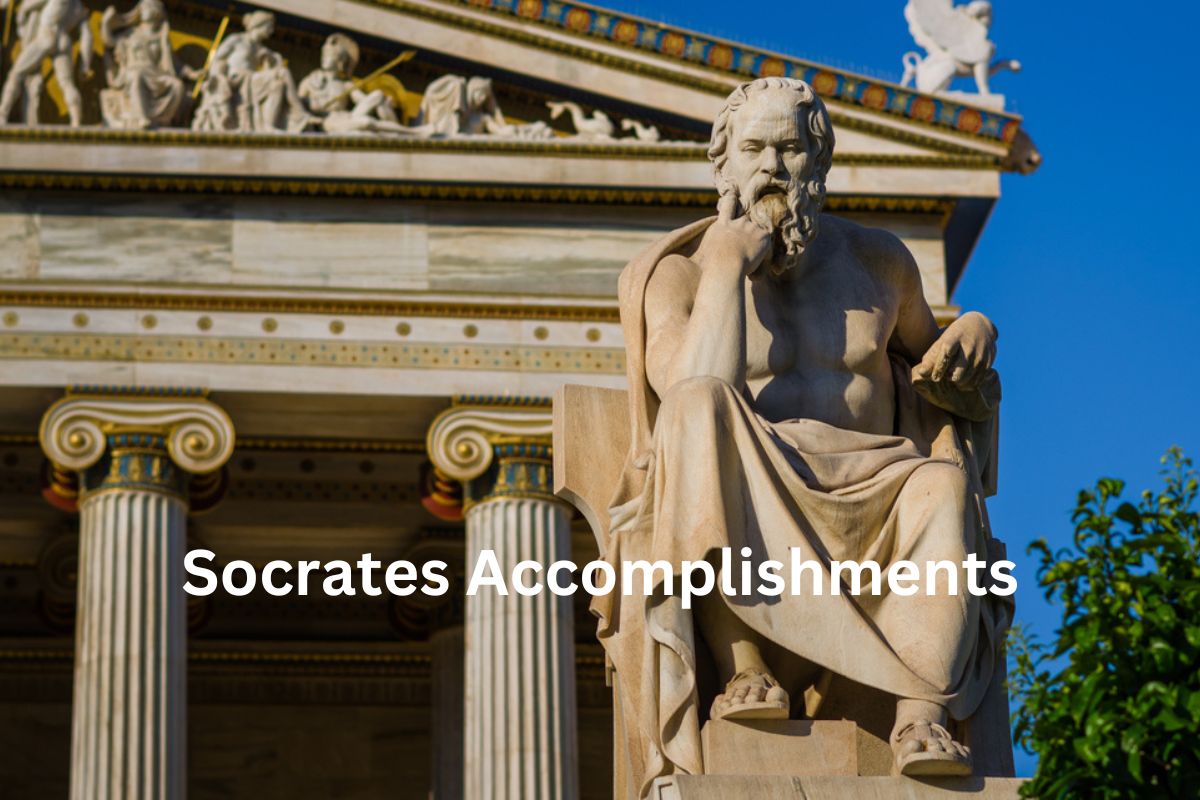Socrates (470/469 BCE – 399 BCE) was an ancient Greek philosopher widely regarded as one of the founders of Western philosophy. Born in Athens, Greece, he left no written works of his own, but his ideas and teachings were recorded by his student Plato and other contemporaries.
Socrates is best known for his development of the Socratic Method, a dialectical approach to inquiry and learning characterized by questioning and critical thinking. He challenged the relativistic views of the Sophists and emphasized the pursuit of moral and ethical virtue.
Socrates’ commitment to truth and intellectual freedom led to his martyrdom, as he chose to drink hemlock rather than renounce his principles.
His legacy continues to influence philosophy, education, and ethics, inspiring generations with his relentless pursuit of knowledge, commitment to self-examination, and unwavering dedication to truth.
Accomplishments of Socrates
1. Founder of the Socratic Method
Socrates is credited with developing the Socratic Method, a dialectical approach to inquiry and learning. Instead of providing direct answers, Socrates used a series of probing questions to engage his interlocutors in critical thinking and self-reflection.
Also Read: Facts About Socrates
Through a method of logical analysis, he aimed to uncover contradictions, challenge assumptions, and arrive at a deeper understanding of truth.
The Socratic Method became a cornerstone of Western philosophy, influencing subsequent thinkers and shaping the way philosophical discussions and debates are conducted.

2. Challenged the Sophists’ relativistic views
During Socrates’ time, the Sophists were prominent intellectuals who taught rhetoric and claimed to possess knowledge and wisdom. However, they often emphasized subjective truth and argued that morality was relative and could be manipulated for personal gain.
Also Read: Socrates Timeline
Socrates engaged in debates with the Sophists, challenging their relativistic views. He sought to establish the existence of objective moral truths and argued for the importance of virtue, wisdom, and justice in human life.
By critiquing the Sophists, Socrates aimed to promote a more grounded and principled approach to ethics and knowledge.
3. Emphasized moral and ethical issues
Socrates was deeply concerned with moral and ethical matters. He believed that the pursuit of knowledge and self-improvement was intimately tied to living a virtuous life. Socrates encouraged individuals to examine their own beliefs, values, and actions in light of rational inquiry and moral principles.
Through his philosophical conversations, he aimed to help people develop a deeper understanding of right and wrong, emphasizing concepts such as justice, honesty, courage, and wisdom.
By focusing on ethical issues, Socrates sought to foster personal and societal growth, encouraging individuals to align their behaviors and choices with moral integrity.
His emphasis on morality and virtue laid the groundwork for ethical theories and discussions that continue to shape moral philosophy today.
4. Influenced Plato, one of the most significant philosophers
One of Socrates’ most significant accomplishments was his influence on Plato, who went on to become one of the greatest philosophers in history. Plato was a devoted student of Socrates and was deeply influenced by his teacher’s ideas and teachings.
In fact, many of Socrates’ philosophical concepts and dialogues were recorded and expounded upon by Plato in his writings. Plato’s dialogues featuring Socrates as the central figure not only preserved Socrates’ teachings but also expanded upon them, contributing to the development of Plato’s own philosophical system.
Socrates’ impact on Plato was profound and far-reaching, shaping the course of Western philosophy for centuries to come.

5. Demonstrated intellectual courage
Socrates had a reputation for engaging young Athenians in philosophical discussions and debates. He believed that the youth had the potential to develop critical thinking skills and uncover profound truths about themselves and the world.
Socrates aimed to inspire the younger generation to question societal norms, beliefs, and assumptions, encouraging them to think for themselves and develop their own understanding of truth and morality.
By fostering a spirit of intellectual curiosity and independent thinking, Socrates sought to empower the youth to become active participants in shaping their own lives and society at large.
His dedication to engaging with the younger generation left a lasting impact on many of his students, such as Plato, who continued to carry forward his teachings.
6. Inspired the youth to think critically
One of Socrates’ most notable accomplishments was his ability to expose ignorance through his relentless questioning. Socrates believed that true wisdom comes from recognizing one’s own lack of knowledge.
By engaging individuals in conversations and posing probing questions, he would reveal inconsistencies, contradictions, and gaps in their thinking. Socrates’ interrogative approach aimed to demonstrate that many people held beliefs without a solid foundation or logical reasoning.
Through the exposure of ignorance, Socrates encouraged individuals to question their assumptions, reevaluate their beliefs, and strive for a deeper understanding of the world.
His method of questioning and intellectual inquiry continues to be an influential tool in philosophical and educational contexts, fostering critical thinking skills and encouraging individuals to seek knowledge and truth.
7. Exposed ignorance through questioning
Socrates was renowned for his ability to expose ignorance through his skillful use of questioning. He engaged in dialogues with people from various walks of life, including politicians, poets, and artisans, challenging their beliefs and assumptions.
By employing the Socratic Method, he would systematically dismantle flawed arguments and expose logical inconsistencies. Socrates’ intent was not to humiliate or embarrass his interlocutors but rather to encourage them to critically examine their own knowledge and beliefs.
Through the process of relentless questioning, Socrates aimed to instill intellectual humility, urging individuals to recognize the limits of their understanding and prompting them to seek a more profound and accurate understanding of the world.
8. Encouraged self-reflection and self-awareness
Socrates encouraged self-reflection and self-awareness as essential components of personal growth and the pursuit of wisdom. He believed that true knowledge begins with understanding oneself and one’s own limitations. Socrates urged individuals to engage in introspection, examining their own beliefs, values, and actions with critical scrutiny.
By questioning and challenging one’s own assumptions, Socrates believed that individuals could gain a deeper understanding of themselves and the world around them.
Through his philosophical conversations, Socrates sought to provoke individuals into examining the consistency and coherence of their own thoughts and values. He emphasized the importance of self-awareness, recognizing that only by knowing oneself can one make informed and morally sound decisions.
Socrates believed that self-examination was not only a path to personal enlightenment but also a means of improving one’s character and leading a virtuous life.
9. Defended intellectual freedom and the pursuit of knowledge
Socrates was a staunch advocate for intellectual freedom and the pursuit of knowledge. He believed that all individuals should have the right to engage in open inquiry and express their ideas freely.
Socrates criticized the societal norms and conventions that discouraged individuals from questioning established beliefs.
He maintained that the pursuit of truth and knowledge was crucial for personal growth and the advancement of society. Socrates challenged the authority of influential figures and institutions, defending his right to engage in philosophical discourse and encouraging others to do the same.
His defense of intellectual freedom laid the groundwork for the principles of free speech and open inquiry that continue to be valued in modern democratic societies.
10. Martyrdom as a symbol of unwavering commitment to truth
Socrates’ unwavering commitment to his philosophical principles ultimately led to his martyrdom. In 399 BCE, he was put on trial in Athens, accused of impiety and corrupting the youth.
Despite having the opportunity to escape or propose a lighter punishment, Socrates chose to remain steadfast in his beliefs and refused to compromise his principles.
He willingly accepted a death sentence, choosing to drink a cup of hemlock, a poisonous substance.
Socrates’ martyrdom has since become a symbol of his unwavering dedication to truth, integrity, and the pursuit of wisdom. His sacrifice elevated him to an iconic status, inspiring subsequent generations to stand firm in their convictions, even in the face of adversity.
